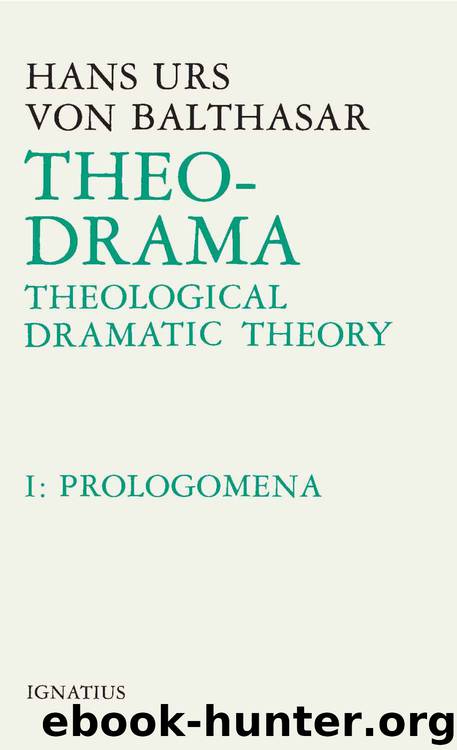Theo-Drama, Vol. 1: Prolegomena by Hans Urs von Balthasar

Author:Hans Urs von Balthasar
Language: eng
Format: mobi
Tags: Spiritual & Religion
ISBN: 9780898701852
Publisher: Ignatius Pr
Published: 1988-10-30T16:00:00+00:00
III. TRANSITION:
FROM ROLE TO MISSION
A. “WHO AM I?”
1. The Meaning of the Question
The theme of the “theatre of the world” seems to belong to the past insofar as it conceives human life as a play that takes place before the eyes of God, who allots the various tasks and judges the play. Yet, some time ago a book was published with the significant title The Presentation of Self in Everyday Life by Erving Goffman.1 The notion of “roles” is more prevalent in psychology and sociology than ever before. And although this may be a transitory vogue (perhaps already on the way out, since “role” is beginning to give way to “function”), the reality behind the particular image is always there, namely, that dualism—which everyone experiences, whether fleetingly or constantly, superficially or profoundly—between what I represent and what I am in reality, between the more or less fortuitous garb I have been obliged to put on (or have willingly put on) in order to stay alive and the body that lies beneath and that is not affected by the change of clothes. This dualism can also retreat to the individual’s internal self: one “has” a particular character that is largely stamped by heredity, but one is not identical with it; La Senne once compared the character with the piano on which the “I” plays; the music thus played would be the person.2 In other words, the acting “I” cannot be, cannot become itself, except through the medium in which it plays, its instrument, which, again, cannot be isolated from the environment in which it lives. This is the problem of every philosophy of the subject. In his L’Action,3 Blondel asks how the subject can be aligned with itself: I must will myself, but it is impossible for me to reach mysell directly, for blocking the way is an unbridgeable abyss. What is done or yearned for always contains less than the one who performs this doing or yearning.4 All the same there is no other starting point but the concrete, the individual thing, for this is “the echo of the complete world order in a unique being”; action, however, seems to be the mediating function that enables the particular to enter into a relationship with the general, it is “the substantial bond (vinculum substantiate) that creates the concrete unity of each particular being by guaranteeing its communion with everything else”.5 In the drama of “action”, therefore, the individual would find himself by finding the whole. This leaves it an open question whether the identity of the “I” with itself has its vanishing point within or above the empirical world, whether it can be attained by the subject’s own efforts or can only be received as a gift in the process of striving for it.6 We can take Blondel’s statement of the question to stand for every appropriate endeavor to discover the coincidence of the “I” with itself; it is a question that must be taken up by all the various anthropological sciences too, each in its own way.
Download
This site does not store any files on its server. We only index and link to content provided by other sites. Please contact the content providers to delete copyright contents if any and email us, we'll remove relevant links or contents immediately.
The Lost Art of Listening by Michael P. Nichols(7506)
Why I Am Not A Calvinist by Dr. Peter S. Ruckman(4153)
The Rosicrucians by Christopher McIntosh(3521)
Wicca: a guide for the solitary practitioner by Scott Cunningham(3179)
Signature in the Cell: DNA and the Evidence for Intelligent Design by Stephen C. Meyer(3138)
Real Sex by Lauren F. Winner(3023)
The Holy Spirit by Billy Graham(2953)
To Light a Sacred Flame by Silver RavenWolf(2823)
The End of Faith by Sam Harris(2742)
The Gnostic Gospels by Pagels Elaine(2531)
Waking Up by Sam Harris(2461)
Nine Parts of Desire by Geraldine Brooks(2369)
Jesus by Paul Johnson(2362)
Devil, The by Almond Philip C(2332)
The God delusion by Richard Dawkins(2309)
Heavens on Earth by Michael Shermer(2284)
Kundalini by Gopi Krishna(2185)
Chosen by God by R. C. Sproul(2164)
The Nature of Consciousness by Rupert Spira(2108)
